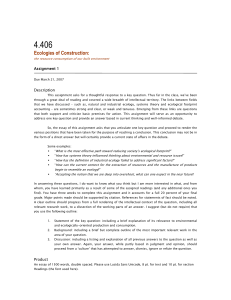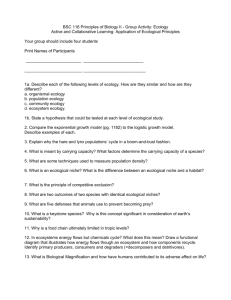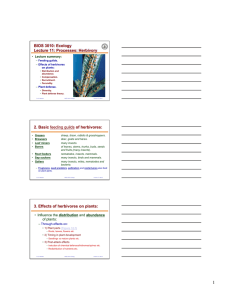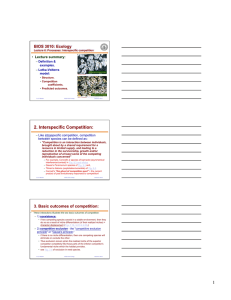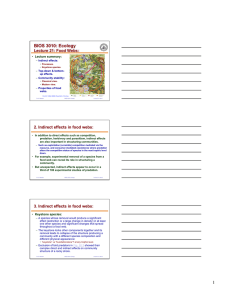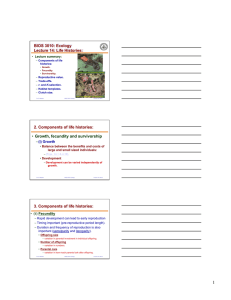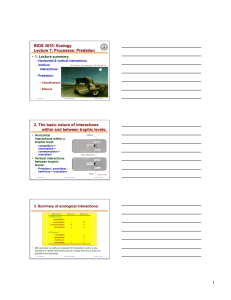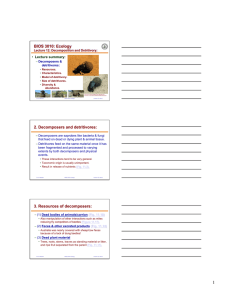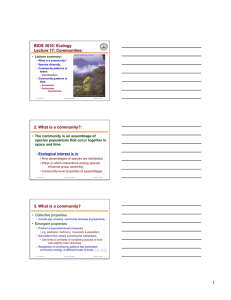Ecology is arguably the most ... and the most complex of ...
advertisement
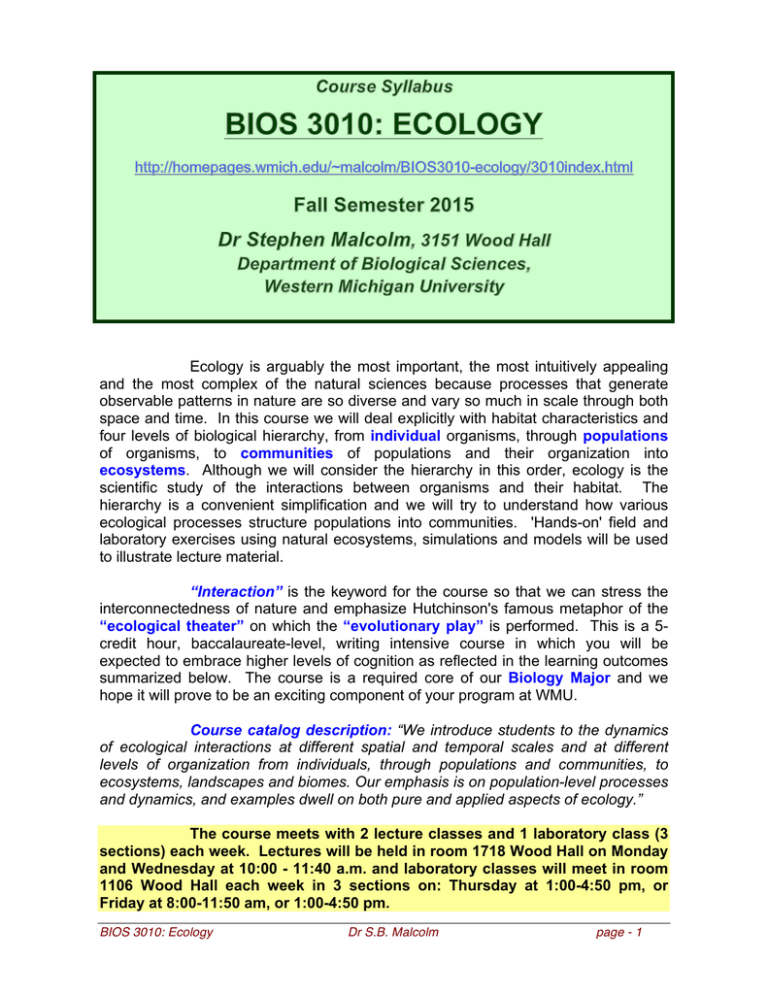
Ecology is arguably the most important, the most intuitively appealing and the most complex of the natural sciences because processes that generate observable patterns in nature are so diverse and vary so much in scale through both space and time. In this course we will deal explicitly with habitat characteristics and four levels of biological hierarchy, from individual organisms, through populations of organisms, to communities of populations and their organization into ecosystems. Although we will consider the hierarchy in this order, ecology is the scientific study of the interactions between organisms and their habitat. The hierarchy is a convenient simplification and we will try to understand how various ecological processes structure populations into communities. 'Hands-on' field and laboratory exercises using natural ecosystems, simulations and models will be used to illustrate lecture material. “Interaction” is the keyword for the course so that we can stress the interconnectedness of nature and emphasize Hutchinson's famous metaphor of the “ecological theater” on which the “evolutionary play” is performed. This is a 5credit hour, baccalaureate-level, writing intensive course in which you will be expected to embrace higher levels of cognition as reflected in the learning outcomes summarized below. The course is a required core of our Biology Major and we hope it will prove to be an exciting component of your program at WMU. Course catalog description: “We introduce students to the dynamics of ecological interactions at different spatial and temporal scales and at different levels of organization from individuals, through populations and communities, to ecosystems, landscapes and biomes. Our emphasis is on population-level processes and dynamics, and examples dwell on both pure and applied aspects of ecology.” The course meets with 2 lecture classes and 1 laboratory class (3 sections) each week. Lectures will be held in room 1718 Wood Hall on Monday and Wednesday at 10:00 - 11:40 a.m. and laboratory classes will meet in room 1106 Wood Hall each week in 3 sections on: Thursday at 1:00-4:50 pm, or Friday at 8:00-11:50 am, or 1:00-4:50 pm. BIOS 3010: Ecology Dr S.B. Malcolm page - 1 I do expect you to attend all lectures and assigned laboratory sections and I strongly recommend that you engage with me, as well as my two outstanding teaching assistants, to discuss the development and submission of graded assignments and exams. Course Objective and Learning Outcomes: Course Objective: To appreciate how the science of ecology is used to describe the distributions and abundances of organisms with an emphasis on the dynamics of biological interactions at different scales of time and space. Expected Learning Outcomes: You should be able to: (1) Demonstrate knowledge of ecological processes and examples. (2) Comprehend theories about how organisms interact. (3) Apply ecological principles to biological problems. (4) Use ecological models in the analysis of biological problems. (5) Synthesize and evaluate biological problems from an ecological perspective. The required textbook is: Begon, M., Townsend, C.R., and Harper, J.L. 2006. Ecology: From Individuals, to Ecosystems. Blackwell Publishing Ltd., 738 pp. 4th edition. (ISBN-13: 978-1-4051-1117-1, or ISBN-10: 1-4051-1117-8) All course material will be taken from the required text, but will be supplemented with material from other texts and published papers, as acknowledged during the course. Text readings and laboratory exercises are listed for each class on the course schedule. Exams will anticipate that you have read this material and listened to material given in lectures. Please bring the textbook to all lectures and lab meetings. In addition, bring a calculator to all lab meetings and exams as well as a no. 2 pencil and pen for exams. BIOS 3010: Ecology Dr S.B. Malcolm page - 2 Grade assignment: Lecture points: 3, one hour exams at 100 each 1 term paper 1 final exam at 200 Total Laboratory points: 10 quizzes at 10 each 10 laboratory exercises at 40 each Total Overall total Grading scale: A = >90% B = >80% C = >70% D = >60% Points 300 200 200 700 100 400 500 1200 BA = >85% CB = >75% DC = >65% E = <60% Lecture exams and term paper: The 3, one-hour exams and the final exam will be a mixture of single or multiple questions that will require either single sentence answers, graphical answers, occasional equations and calculations, or short essays. The term paper will be a structured, hypothesis-based review of an ecological topic of your choice. The term paper topic will be chosen at the start of the course and the final paper will be handed in for evaluation no later than the lecture meeting on December 7. Further information about the paper will be available on the course website at: http://homepages.wmich.edu/~malcolm/BIOS3010ecology/3010index.html. There will also be opportunities to earn bonus points. Laboratory grade assignment: Teaching Assistants: Nicholas Martin (Thursday p.m.) and Matthew Deighton (Friday a.m. and Friday p.m.). BIOS 3010: Ecology Dr S.B. Malcolm page - 3 Six of the 13 lab meetings will be in the laboratory (including computer sessions) and 5 will be in the field. The first lab session is for hands-on library orientation in the Waldo library and the last meeting is a review session for the whole course. 11 of the lab meetings will start with a short quiz. The 10 best of the 11 quizzes will be used towards course grade assignments. The laboratory classes cover topics timed to complement the lectures. The rationale, methods and results for each of these exercises should be described in writing by each student and handed to the TA on the week following the relevant lab. The 10 best of these reports will be used towards course grade assignments. Academic integrity: Cheating, fabrication and plagiarism will result in a score of zero for the relevant activity and will be treated as described under “Student Rights and Responsibilities” at: http://catalog.wmich.edu/content.php?catoid=22&navoid=882 of the current Undergraduate Catalog. “You are responsible for making yourself aware of and understanding the University policies and procedures that pertain to Academic Honesty. These policies include cheating, fabrication, falsification and forgery, multiple submission, plagiarism, complicity and computer misuse. (The academic policies addressing Student Rights and Responsibilities can be found in the Undergraduate Catalog at http://catalog.wmich.edu/content.php?catoid=22&navoid=882 and the Graduate Catalog at http://catalog.wmich.edu/content.php?catoid=23&navoid=938.) If there is reason to believe you have been involved in academic dishonesty, you will be referred to the Office of Student Conduct. You will be given the opportunity to review the charge(s) and if you believe you are not responsible, you will have the opportunity for a hearing. You should consult with your instructor if you are uncertain about an issue of academic honesty prior to the submission of an assignment or test.” You are also encouraged to access the Office of Student Conduct www.wmich.edu/conduct, the Registrar’s Office www.wmich.edu/registrar or Disability Services for Students www.wmich.edu/disabilityservices to access the Code of Honor and general academic policies on such issues as diversity, religious observance, student disabilities, etc. Religious Observances Policy: http://www.wmich.edu/policies/religious-observances-policy http://www.wmich.edu/facultysenate/downloads/MOA0702_religious_observances_final.pdf ”The University is a diverse, multicultural enterprise and, as a community, we jointly embrace both individual responsibility and dignified respect for our differences. It is our general policy to permit students to fulfill obligations set aside by their faith. It is our intent that students who must be absent from scheduled classes to fulfill religious obligations or observe practices associated with their faith not be disadvantaged. However, it is the student’s responsibility to make arrangements with his/her instructors in advance. It is in the student’s best interests to approach each instructor expeditiously and with sufficient notice that the rights and responsibilities of the BIOS 3010: Ecology Dr S.B. Malcolm page - 4 instructor are not disrupted. Instructors should make it known to classes early in the term what they consider reasonable notice for anticipated absences. Without specifying a fixed notification time, we acknowledge in this policy joint responsibility: instructors will inform students of their requirements and students will make every effort to cause no disruption in the instructors’ plans and duties. Instructors should assume that a claim of religious observance has veracity, especially when advance notice is provided by the student. Students likewise must recognize that it is their responsibility to meet all their course obligations. Instructors are not obligated to provide materials to students unless these materials would have normally been distributed to the entire class. For example, if an instructor does not normally post notes, a student cannot expect notes to be provided for lectures missed. If instructors choose to incorporate adjustments into the syllabus intended to cover student absences, it should be explicit that these apply to absences for religious observances, as well as all other contingencies.” Office hours: Dr Stephen Malcolm Room 3151 Wood Hall Monday, Wednesday: 1:00 - 3:00 p.m. Tel: (269) 387-5604 E-mail: steve.malcolm@wmich.edu Fax: (269) 387-5609 BIOS 3010: Ecology Dr S.B. Malcolm page - 5 Fall 2015 schedule for BIOS 3010 - ECOLOGY Date Class Topic Text Sep 9 lecture 1 Habitat: Conditions & constraints ch 2 10/11 14 lab 1 lecture 2 Literature research - Waldo library Habitat: Resources ch 3 16 17/18 21 lecture 3 lab 2 lecture 4 Birth and death Scientific methods in ecology & conditions Distribution and movement (paper topic due) ch 4 23 24/25 lecture 5 lab 3 Processes: Intraspecific competition Life tables ch 5 28 30 lecture 6 lecture 7 Processes: Interspecific competition Processes: Predation ch 8 ch 9 Oct 1/2 Oct 5 lab 4 EXAM 1 Competition lectures 1 - 6 7 8/9 lecture 8 lab 5 Predator foraging & prey defense Mark and recapture ch 9 12 14 lecture 9 lecture 10 Dynamics of predation Processes: Parasitism & disease ch 10 ch 12 15/16 19 lab 6 lecture 11 Lotka-Volterra & the logistic equation Processes: Herbivory (bibliography due) 20 22/23 lecture 12 lab 7 Processes: Decomposition & detritivory Goldenrod gall density 26 28 EXAM 2 lecture 13 lectures 7 - 12 Processes: Symbiosis & mutualism 29/30 Nov 2 lab 8 lecture 14 Term paper plan – 10 min. presentations Life histories 4 5/6 lecture 15 lab 9 Abundance & metapopulations Density dependence 9 11 lecture 16 lecture 17 Manipulating abundance Communities 12/13 16 lab 10 lecture 18 Dispersion analysis Community matter and energy flux 18 19/20 lecture 19 lab 11 Community structure & competition Metapopulation dynamics 23 25 lecture 20 EXAM 3 Community structure & predation lectures 13 – 20 26/27 30 No lab lecture 21 Thanksgiving recess Food webs Dec 2 3/4 lecture 22 lab 12 Island biogeography Stream diversity 7 8 lecture 23 lecture 24 Biodiversity & conservation Abundance or catastrophe? lab 13 FINAL EXAM Review Monday, December 14, 10:15 a.m. – 12:15 p.m., Room 1718, Wood Hall 10/11 Dec. 14 BIOS 3010: Ecology Lab exercise Library Lab ch 6 Lab computer Lab computer Field Lab computer ch 9 & 12 ch 11 Field ch 13 Lab ch 4 ch 6 & 14 Lab computer ch 15 ch 16 Field ch 17 & 18 (paper) ch 19 Field ch 19 ch 20 ch 21 & 22 Field (final paper due) Dr S.B. Malcolm ch 21 & 22 Course review page - 6 BIOS 3010: Ecology Dr S.B. Malcolm page - 7


